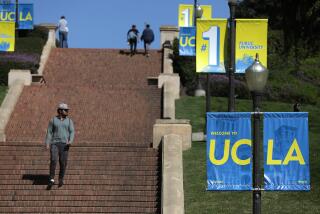BOOK REVIEW : Tall Tale From Halls of Higher Education : KILLER DILLER<i> by Clyde Edgerton</i> Algonquin Books of Chapel Hill $17.95, 247 pages
- Share via
To read Clyde Edgerton’s wonderful new novel, “Killer Diller,” with maximum appreciation, it’s useful--but not mandatory--to have a working knowledge of Christianity at its best and worst, an acquaintance-ship with the politics of small colleges, and some background in fund raising.
If you don’t have any of the above, don’t worry too much; Clyde Edgerton will give it to you, but you won’t realize how expertly you’re being taught.
The place is Summerlin, N.C. The time is August, 1989. The situation is this: Ballard University (the kind of “university” that covers a few city blocks at best and will let in a moron if he can pay the tuition) has received a $320,000 grant for what looks like a promising new project. In fact it’s called Project Promise.
It involves, on the one hand, juvenile delinquents and ex-cons living at a halfway house called BOTA. No, BOTA doesn’t stand for that wineskin from which people drink at bullfights. It is, rather, the touching acronym for “Back On Track Again.” The university proposes taking these dubious boys and training them to teach “special students,” that is, the mentally retarded, menial skills like masonry.
A person versed in fund raising can see that this has “good public relations” written all over it. While smart, rich students may be in short supply, there will never be an end to convicts and dead-broke retarded people, not in this impoverished part of the South.
Project Promise is a logical outgrowth of Ballard University’s recently founded School of Nutrition, a kind of campus fat farm that has attracted fat girls nationwide, because that’s another commodity America will never run out of.
Ballard University is a Christian institution. It is run by twins--Ted and Ned Sears, two of the most unappetizing representatives of this religious persuasion ever to find their way into print. Ted is handsome, anal retentive, dresses in $700 suits, and spends his life wresting money from dear widow ladies. Ned, the provost, spends most of his time spying on students, making sure they don’t drink, smoke dope, kiss or sing anything but Christian hymns.
Ned has his work cut out for him, though, thanks to Project Promise. Those delinquent boys--dead broke and squirrelly--are working from another set of plans.
Wesley Benfield, an unregenerate car thief and true Christian, needs to find a guitar and get himself a girlfriend. He quickly meets Phoebe Trent, 230 pounds.
Wesley’s “special” protege, a sweet boy named Vernon Jackson who looks like a possum and drives invisible cars, provides a guitar--or his father does. It’s lying in a corner, partial payment for some mechanical job.
This is a growing-up novel in the very best sense. Wesley struggles with what it means to be a Christian: Would Jesus wear a $700 suit? Wesley begins to compose, to put his thoughts into words. He knows what he wants: He wants to have his own group and to sing and play, but he wants love and a family.
It turns out that Vernon, the “possum” boy, is only so-so at learning masonry, but--”He can flat play a piano. It’s the only thing he can do.”
But if you think that Ted and Ned Sears are going to allow any of these pagan goings-on, you haven’t met the wrong kind of Christian. The plot unfolds. Clyde Edgerton tells us another of his lovely tall tales. The reader can be assured that somebody somewhere is having a happy life, even if it’s only in Edgerton’s felicitous imagination.
Next: Charles Johnson reviews “Martin and Malcolm and America” by James H. Cone (Orbis Books).
More to Read
Sign up for our Book Club newsletter
Get the latest news, events and more from the Los Angeles Times Book Club, and help us get L.A. reading and talking.
You may occasionally receive promotional content from the Los Angeles Times.









